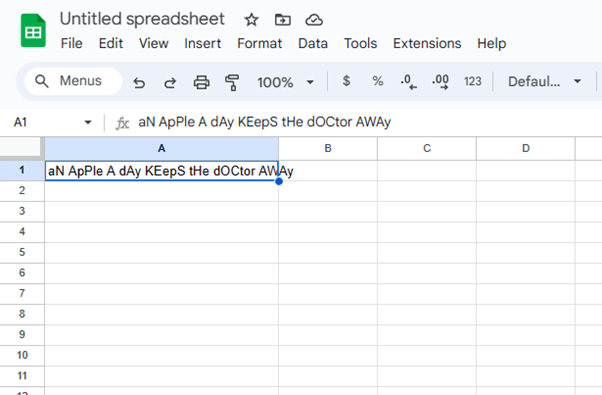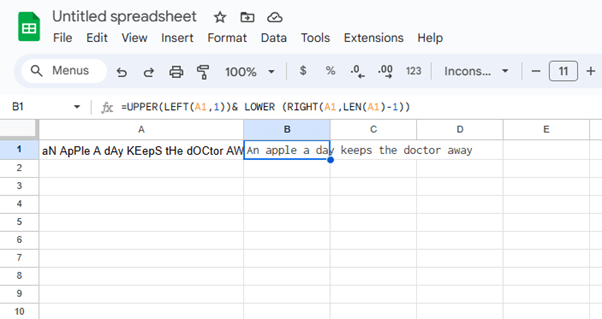What Is Sentence Case? | Explanation & Examples
Sentence case is a capitalisation style or set of rules describing when to use lowercase and uppercase letters in headings and subheadings. Whether you are writing a research paper, a blog, or a newspaper article, you may have to decide which words need to be capitalised.
In English, the standard is to capitalise the first letter of a sentence. All other letters should be in lowercase with a few exceptions, such as proper nouns (e.g., “Texas”), abbreviations (e.g., “Dr”), and acronyms (e.g., “NATO”). Because this style follows the same capitalisation rules as sentences, it is called “sentence case”.
However, different style guides may have different rules. It’s important to consistently follow the rules outlined in your chosen style guide. You can also use the Scribbr citation generator, which automatically proposes the correct capitalisation for citations.
How to use sentence case
When using sentence case, capitalise the first letter of the first word of your title or subheading.
In addition, you need to capitalise proper nouns, such as the names of specific people (e.g., “Tom”), places (e.g., “Italy”), or things (e.g., “the Golden Gate Bridge”) as opposed to common nouns like “person”, “country”, or “bridge”. All other words should be written in lowercase.
The best way to cook pasta like an Italian.
Sentence case vs title case
Sentence case is used when you write a title or a subheading the same way you would write a regular sentence. In sentence case, the first letter of the first word is capitalised, and all other letters and words that follow are in lowercase, except for proper nouns (e.g., “Major heat wave arrives in California”).
In contrast, title case is used when you capitalise the initial letter of most words in a sentence. Just like in sentence case, some exceptions apply to title case as well. For example, title case distinguishes between major and minor words:
- Major words are nouns, adjectives, and verbs. These should be capitalised.
- Minor words are short words like articles, prepositions, or conjunctions (e.g., “of”, “the”, “and”). These types of words should not be capitalised.
Title case is primarily used for the titles of published works (like books, movies, or song titles) or works of art in English. For example, we would normally write A Tale of Two Cities and not A tale of two cities.
When to use sentence case
Organisations and publishers have different style guides which set the standards for writing and formatting texts, including headline capitalisation. For example, the New York Times uses title case, while the Associated Press (AP) and the BBC use sentence case.
If you are writing a research paper or academic essay, it’s best to check if there is a style guide you need to follow. In APA style, for example, sentence case is the standard for titles of articles, books, reports, webpages, and other works in reference lists and bibliographies, even if title case is used in the original work. However, titles referenced within the main body of the text are written in title case.
Main body of the text: In her series of essays entitled “On Photography”, Sontag (2008) examines photography and its position in contemporary culture.
On the other hand, if you are writing an article for your own blog or website, it’s entirely up to you to decide whether you want to use sentence case or not.
Sentence case examples
Here are a few examples of sentence case capitalisation to help you understand the basic rules.
- AI can be a force of good or ill in society.
- Ai can be a force of good or ill in society.
“AI” is an abbreviation and needs to be capitalised.
Example 2:
- In Darwin’s footsteps: sailing ship to retrace round-the-world voyage of the Beagle.
- In darwin’s footsteps: Sailing ship to retrace round-the-world voyage of the beagle.
“Darwin” and “the Beagle” are proper nouns and need to be capitalised. The first letter after a colon is generally not capitalised, although some style guides may differ in the advice they offer.
Example 3:
- White House asks Congress for additional $24bn in aid.
- White house asks congress for additional $24bn in aid.
In this sentence, “White House” and “Congress” are proper nouns and should be capitalised.
Sentence case converter
If you want to proofread your text and make sure it has the right capitalisation, there are a number of free online tools you can use. Keep in mind that although these are handy, they are not always correct.
To check your work, you can either type the text directly in the box or copy-paste it. Then choose “Sentence case” from the menu below the box and the converter automatically transforms the text. However, it won’t capitalise names or places. Once the text has been converted, you can download it or copy it to your clipboard.
This converter corrects or restores the capitalisation of uncased or poorly capitalised text. It can help you correct text written in lowercase or all caps in different languages. Selecting the option “Highlight changes” allows you to keep track of any changes in the text (these are highlighted in orange).
This is a simple and easy to navigate online converter. You type or copy-paste your text and then select one of the four options: “UPPER CASE”, “lower case”, “Proper Case”, and “Sentence case”. Once you select the “Sentence case” option, the text is converted. However, this tool only capitalises the first letter of the sentence and not names of places or people.
Sentence case in Excel
Although Excel has functions for uppercase, lowercase, and proper case (to capitalise each word in a given string), it doesn’t have a specific function for sentence case. However, you can apply a sentence case function as a custom function.
Below is an example of mixed text with letters in both uppercase and lowercase in cell A1.
You can enter the following function in B1: =UPPER(LEFT(A1,1))&LOWER(RIGHT(A1,LEN(A1)-1))
Other interesting language articles
If you want to know more about nouns, pronouns, verbs, and other parts of speech, make sure to check out some of our other language articles with explanations and examples.
Frequently asked questions about a sentence case
Cite this Scribbr article
If you want to cite this source, you can copy and paste the citation or click the ‘Cite this Scribbr article’ button to automatically add the citation to our free Reference Generator.
Nikolopoulou, K. (2023, September 03). What Is Sentence Case? | Explanation & Examples. Scribbr. Retrieved 2 July 2025, from https://www.scribbr.co.uk/academic-style/what-is-sentence-case/





